Evidence-Based Treatment Examples

Understanding Evidence-Based Treatments
Evidence-based treatments are cornerstone approaches in modern mental health care, designed to integrate scientific research with clinical expertise to deliver optimal outcomes. These interventions stand on a robust foundation of empirical validation, ensuring that patients receive therapies that are both safe and effective. As mental health challenges become more prevalent, the demand for therapies that are tailored yet scientifically sound has surged, making evidence-based treatments more relevant than ever. This guide explores the principles, examples, and significant benefits of these approaches across various contexts, including their application to veterans, children, and diverse mental health conditions.
Defining Evidence-Based Treatments
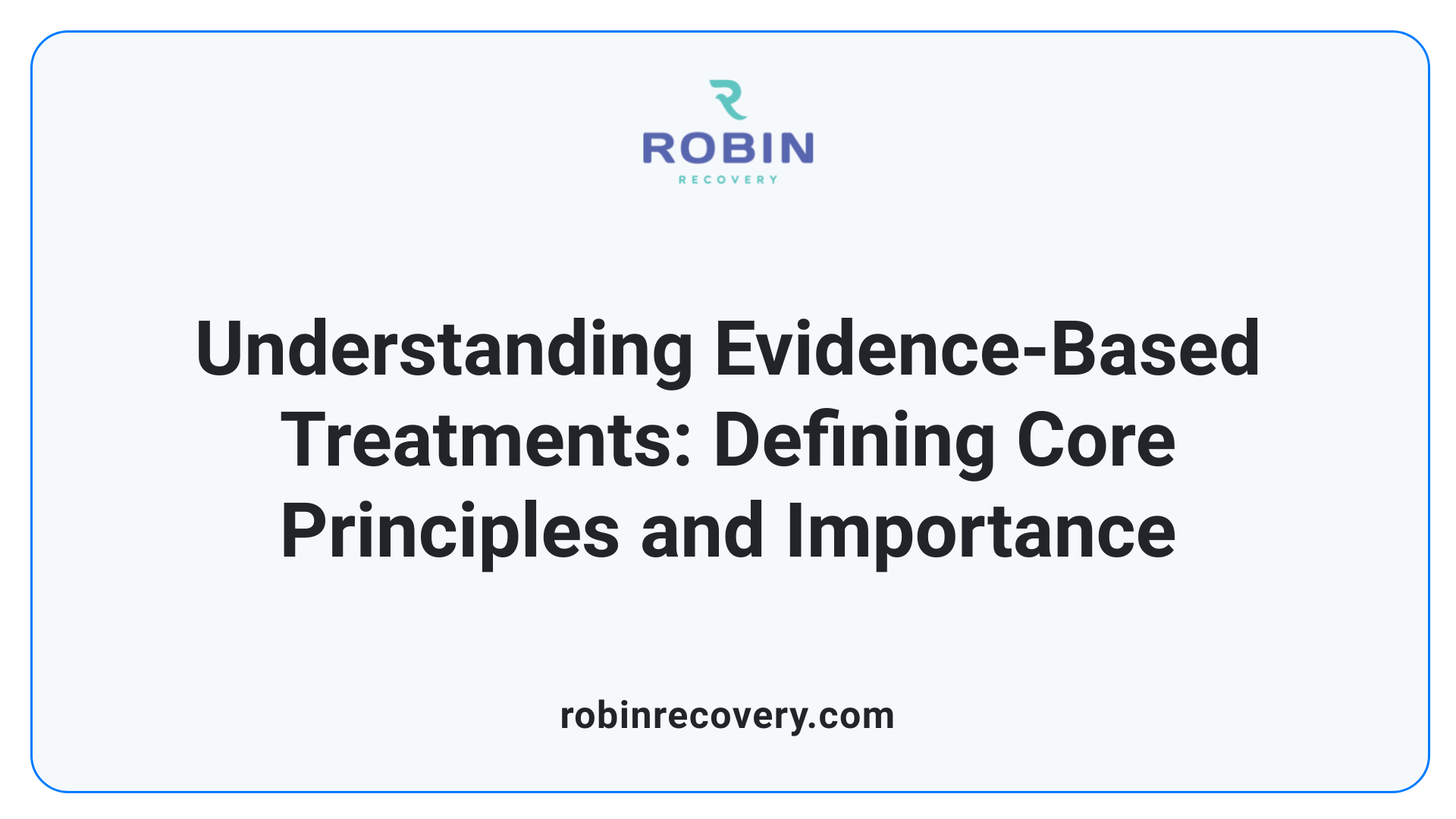
What is evidence-based treatment?
Evidence-based treatment refers to interventions that are scientifically validated through rigorous research methodologies, including clinical trials, reviews, and meta-analyses. These approaches are built on the foundation of empirical evidence and clinical expertise, ensuring that treatments are not only effective but also adapted to the individual needs and preferences of clients.
The principles of evidence-based therapy (EBT) emphasize integrating solid research findings with the clinician’s professional judgment. This includes taking into account patient values, preferences, and cultural contexts when tailoring treatment plans. Some prominent examples of evidence-based treatments include:
- Cognitive Behavioral Therapy (CBT): Known for altering negative thought patterns to improve mental health outcomes.
- Motivational Interviewing: A technique that enhances motivation for change by working collaboratively with clients.
- Acceptance and Commitment Therapy (ACT): Focuses on psychological flexibility and acceptance of thoughts and feelings.
Importance of integrating research and clinical expertise
Integrating research with clinical expertise is critical for optimizing therapeutic effectiveness. Evidence-based practices allow for dynamically informed decision-making that respects the specific circumstances and backgrounds of clients. This approach not only supports clinicians in delivering the most effective care but also enhances treatment adherence and satisfaction among clients.
Moreover, while evidence-based therapies demonstrate high efficacy, implementation may face challenges, such as ensuring fidelity to the treatment model and providing adequate training for providers. Addressing these aspects can promote a higher quality of care and improve overall mental health outcomes across diverse populations.
The Critical Role of Evidence-Based Treatments
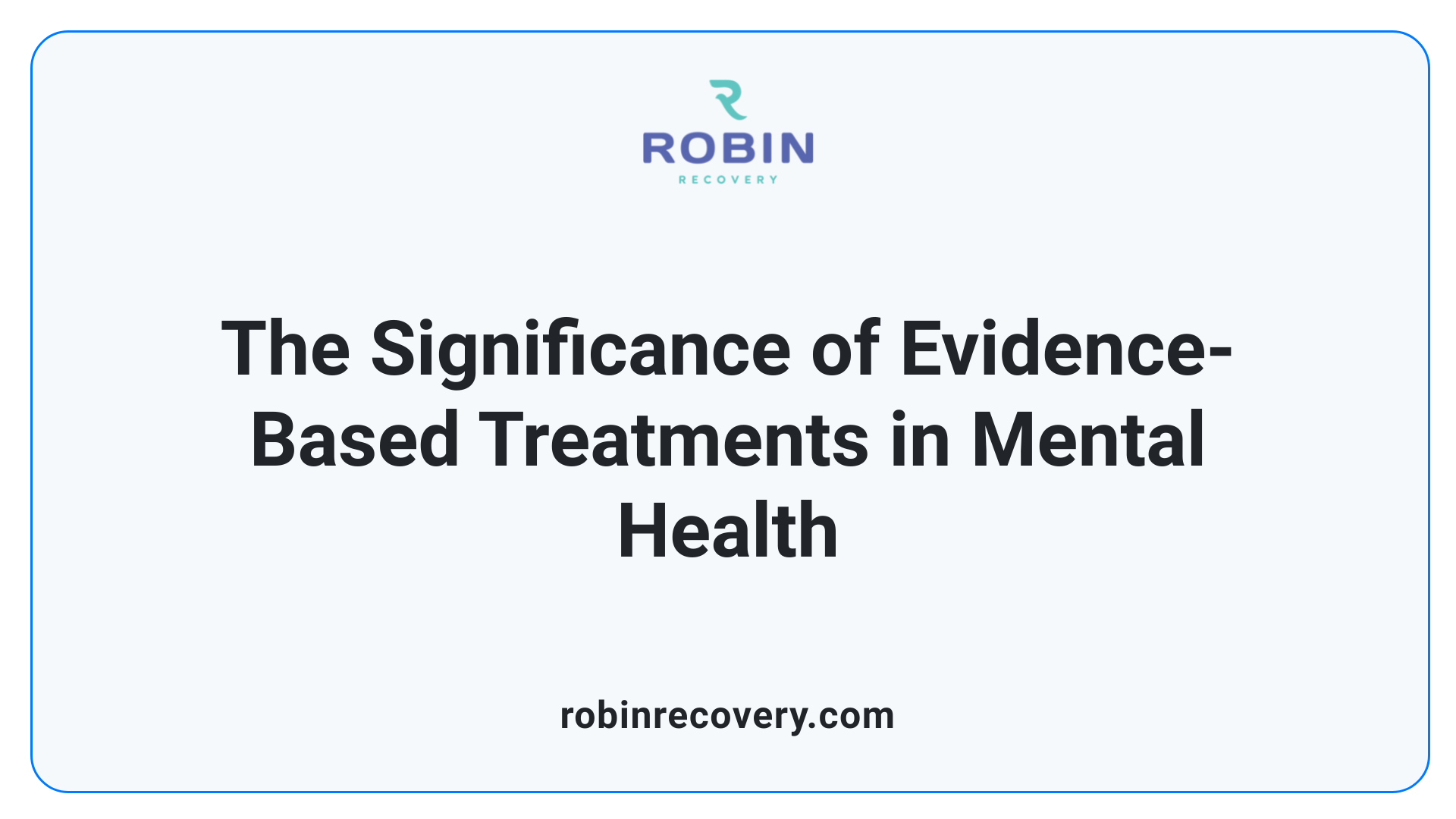
Why is evidence-based treatment important?
Evidence-based treatment is crucial because it relies on scientifically validated therapies. This ensures both effectiveness and safety for patients, which ultimately leads to better clinical outcomes. By integrating patient values, clinical expertise, and the best available evidence, healthcare providers can create personalized care plans that respect individual needs and cultural contexts.
This method doesn’t just focus on theoretical knowledge; it actively seeks to enhance patients’ quality of life by promoting accountability. It also minimizes bias during treatment decisions. Evidence-based practices, such as Cognitive Behavioral Therapy (CBT), have shown efficacy in treating various mental health conditions and often require limited session durations, making them suitable for efficient care delivery.
Implementing evidence-based treatment can enhance the overall quality of mental health services. It encourages ongoing learning and adaptation for both providers and clients, ensuring therapies remain relevant and effective. When validated treatments guide clinical practice, patients can expect not just relief from symptoms, but a comprehensive improvement in their well-being.
Cognitive Behavioral Therapy and Its Impact
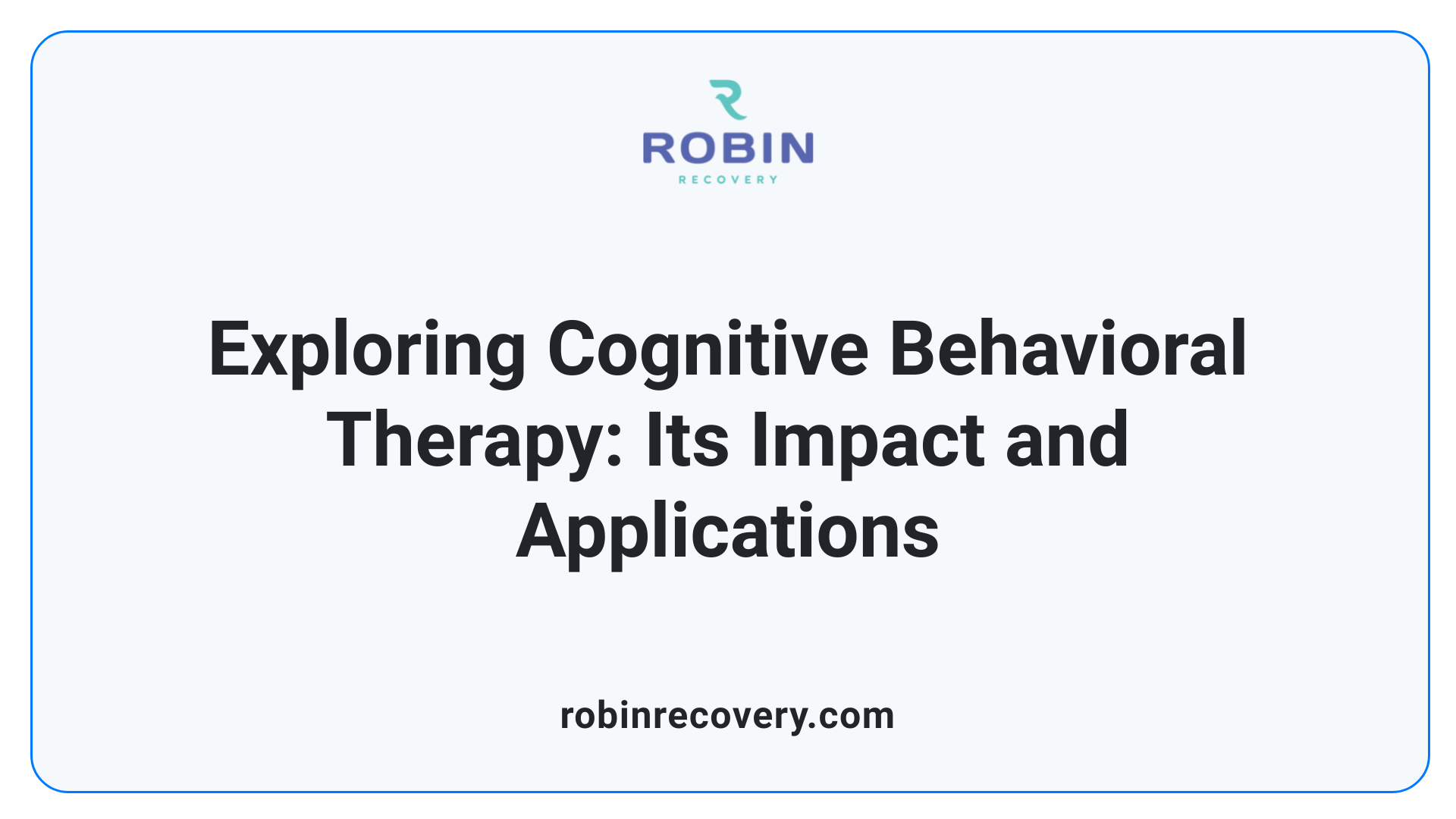
Overview of CBT
Cognitive Behavioral Therapy (CBT) is a well-supported evidence-based treatment effective for a range of mental health issues, including anxiety, depression, and post-traumatic stress disorder (PTSD). This approach focuses on modifying negative thought patterns and addressing maladaptive behaviors that can lead to emotional distress. With an emphasis on practical strategies, CBT helps clients develop coping skills, ultimately aiming for symptom relief and improved mental health outcomes. Typically, CBT involves structured sessions that range from around 12 to 20 weeks, allowing clients to explore their thoughts and behaviors in a supportive environment.
Specific Applications for Depression and Anxiety
For individuals grappling with depression, CBT serves multiple purposes. It encourages clients to identify and challenge distorted thinking, engage in cognitive restructuring, and practice behavioral activation, which involves participating in enjoyable activities that can uplift mood.
Moreover, CBT has proven particularly effective for managing anxiety by systematically exposing individuals to their fears while teaching relaxation techniques. By addressing both cognitive and behavioral aspects of anxiety, clients learn to manage their symptoms more effectively.
Examples of evidenced-based variants like Acceptance and Commitment Therapy for Depression (ACT-D) and Behavioral Activation provide further options tailored to specific needs. These therapies encourage acceptance of thoughts and action aligned with personal values, enhancing overall well-being.
CBT, with its adaptable and structured approach, stands out as a cornerstone in the landscape of mental health treatment, demonstrating significant efficacy in diverse settings, including for veterans and the general population.
Exploring Other Evidence-Based Practices
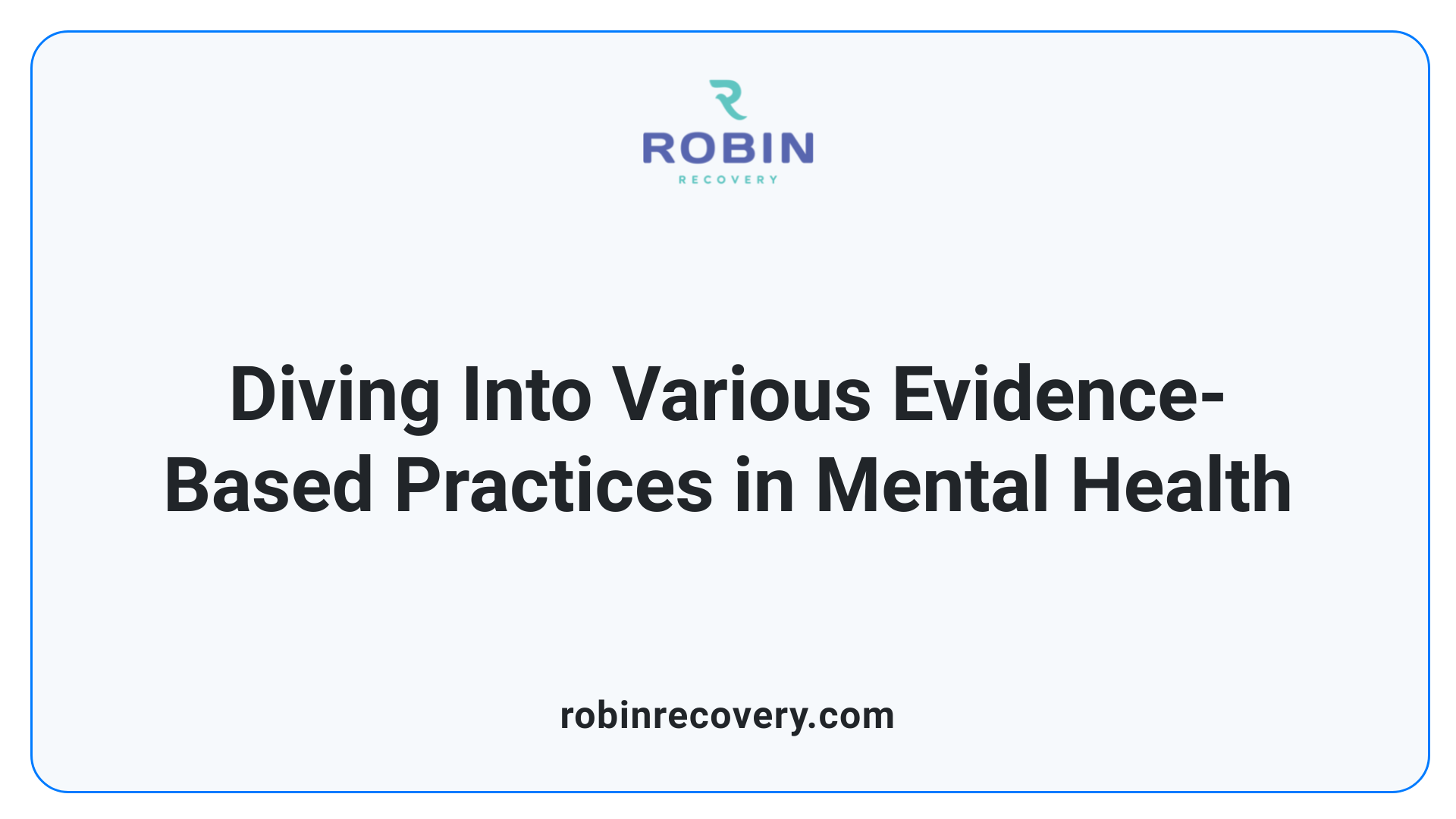
What are some examples of evidence-based practices in mental health?
Evidence-based practices in mental health are grounded in scientific research and clinical expertise, ensuring that treatments are effective and tailored to individual needs. Some prominent evidence-based therapies include:
Therapy Type Supported Issues Description Cognitive Behavioral Therapy (CBT) Anxiety, Depression, PTSD Focuses on identifying and changing negative thought patterns. Dialectical Behavior Therapy (DBT) Borderline Personality Disorder, PTSD Integrates CBT with mindfulness strategies to manage emotions. Eye Movement Desensitization and Reprocessing (EMDR) PTSD Uses guided eye movements to process and integrate traumatic memories. Mindfulness-Based Cognitive Therapy (MBCT) Recurrent Depression Combines cognitive therapy with mindfulness practices. Acceptance and Commitment Therapy (ACT) Anxiety, Depression, Substance Abuse Encourages acceptance of thoughts while committing to personal values. Trauma-Focused Cognitive Behavioral Therapy (TF-CBT) Childhood Trauma Designed for children, it helps process trauma through cognitive-behavioral techniques. Applied Behavior Analysis (ABA) Autism Spectrum Disorder Emphasizes behavior modification through reinforcement techniques.
These therapies vary in their focus and applications, catering to a wide range of mental health conditions. Furthermore, integration of individual values and preferences in treatment planning fosters a more personalized approach, enhancing engagement and efficacy in care.
Tailoring Treatments: A Collaborative Approach
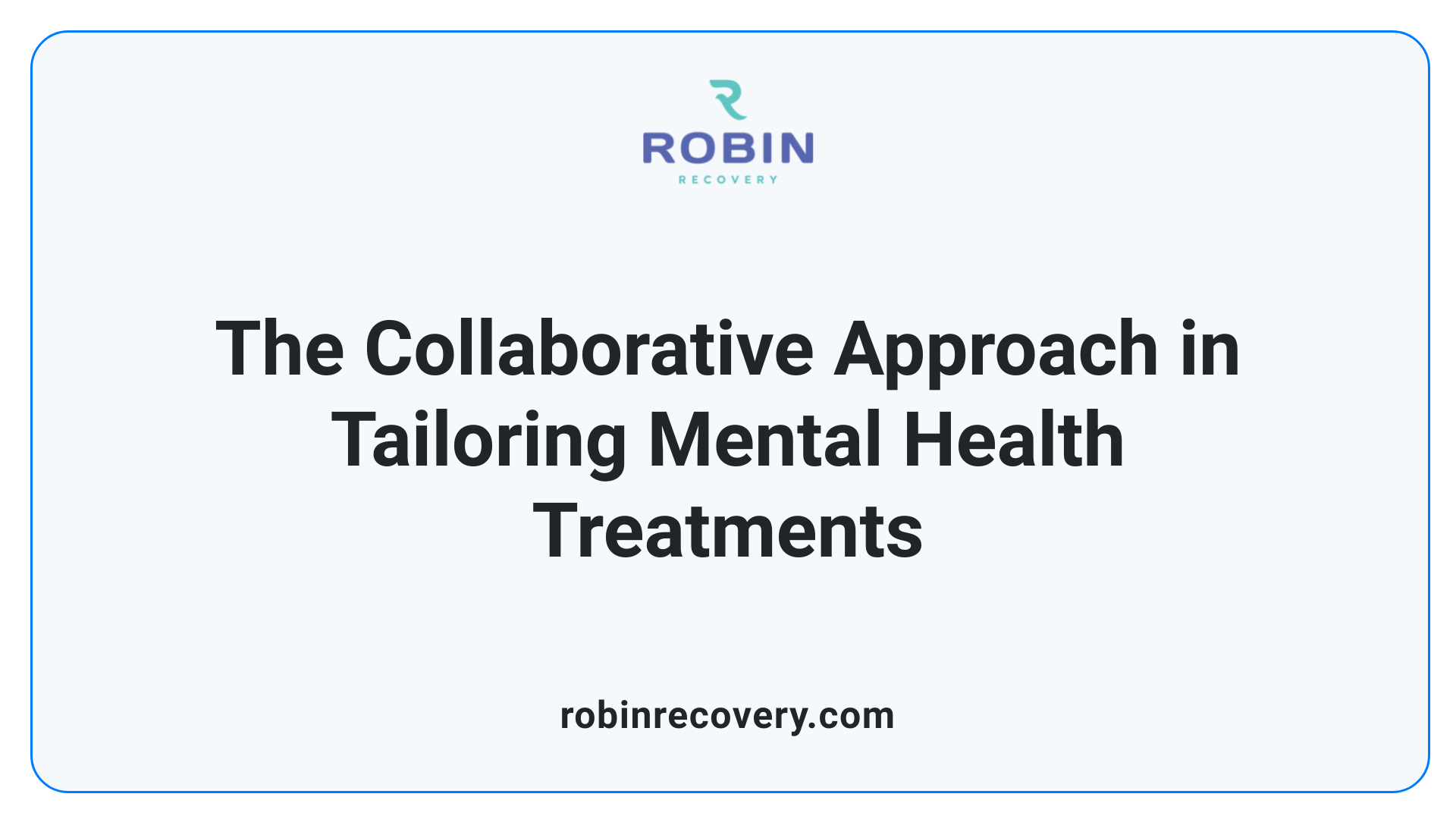
Collaboration in Treatment Development
Evidence-based practices (EBPs) in mental health care emphasize a collaborative approach between therapists and clients to ensure that treatments are tailored to individual needs. This process involves not only the integration of the best available research but also the inclusion of clinical expertise and patient preferences. When therapists actively engage clients in their own treatment planning, it empowers them and enhances motivation, which is crucial for effective therapy outcomes.
Patient-Centered Care Focus
Patient-centered care in the context of EBPs means prioritizing the unique experiences and values of each individual. This approach fosters open communication, allowing clients to voice their thoughts on treatment options and goals. Research has shown that such collaboration significantly improves treatment effectiveness, as clients who feel heard and involved are more likely to stick to their treatment plans. For instance, therapies like Acceptance and Commitment Therapy (ACT) and Cognitive Behavioral Therapy (CBT) exemplify this by focusing on the client’s personal goals and values while integrating evidence-based methods.
Additional Insights
To further illustrate the collaborative nature of mental health treatment, consider evidence-based instructional strategies (EBIs), which prioritize validated teaching methods to enhance learning outcomes. Techniques like setting clear goals and providing timely feedback in educational settings resonate similarly with the therapeutic alliance formed in EBPs. This continuous exchange between practitioner and client ultimately leads to tailored, effective interventions for overcoming mental health challenges.
Evidence-Based Practices in Social Work vs. Counseling
How do evidence-based practices in social work and counseling differ?
Evidence-based practices (EBPs) in social work and counseling differ notably in their focus and methodology. Social work emphasizes a broader community perspective, aiming to address systemic issues and enhance resources within communities. This might involve integrating family therapy interventions, where therapists work with families to visualize solutions to their challenges, or implementing community-level programs to support vulnerable populations.
In contrast, counseling largely concentrates on individual therapeutic techniques. For instance, modalities like Cognitive Behavioral Therapy (CBT) and Dialectical Behavior Therapy (DBT) target personal thought patterns and behaviors. These approaches help clients recognize and alter distorted thinking or emotional responses, enhancing their personal well-being and mental health.
Distinct roles and methods
While both fields are rooted in research-backed methods, their applications differ significantly. Social workers might address issues like access to healthcare or community resource management, blending advocacy with counseling techniques. For example, frameworks like Acceptance and Commitment Therapy (ACT) could be utilized to support individuals in making value-based decisions that consider broader social contexts.
Conversely, counselors emphasize direct client interactions, utilizing structured therapies like Mindfulness-Based Cognitive Therapy (MBCT) or Behavioral Activation, focusing on individual experiences of anxiety or depression. These distinct roles highlight their common goal of improving well-being through varied lenses and methodologies.
Aspect Social Work Focus Counseling Focus Primary Focus Community and systemic issues Individual thoughts and behaviors Intervention Methods Advocacy and resource enhancement Therapeutic modalities like CBT, DBT Approach to Clients Broader community engagement Direct therapeutic relationships
Understanding Cognitive-Behavioral Therapy (CBT)
CBT Methodology
Cognitive-Behavioral Therapy (CBT) is a structured, goal-oriented psychotherapy that focuses on identifying and altering negative thought patterns and behaviors. This approach encourages clients to recognize cognitive distortions—irrational beliefs and catastrophic thinking—that fuel emotional distress. Clients learn to challenge these thoughts and replace them with more balanced and constructive ones.
CBT typically involves various techniques, including cognitive restructuring and behavioral activation. Cognitive restructuring helps individuals reframe their negative thoughts, while behavioral activation encourages participation in enjoyable activities, significantly alleviating symptoms of depression.
Effectiveness and Application for Various Conditions
Research indicates that CBT is widely effective for a range of mental health disorders, such as anxiety, depression, PTSD, and obsessive-compulsive disorder (OCD). Specific protocols, like Exposure and Response Prevention (ERP) therapy, are derived from CBT and address phobias and compulsions.
Given its evidence-backed methodology, CBT has become one of the most implemented therapies, showing positive outcomes in as few as 12 sessions for many individuals. It is preferred among therapists as it emphasizes a collaborative approach that integrates clients' values and experiences.
Dialectical Behavior Therapy (DBT) and Mindfulness
DBT Framework and Effectiveness
Dialectical Behavior Therapy (DBT) is a modified form of Cognitive Behavioral Therapy (CBT) designed primarily for individuals with borderline personality disorder but also effective for various mental health issues, including anxiety and PTSD. DBT incorporates four primary modules:
- Mindfulness
- Distress Tolerance
- Emotional Regulation
- Interpersonal Effectiveness
Research shows that DBT significantly reduces suicidal ideation and self-harming behaviors, making it a sought-after approach for those facing extreme emotional distress.
Use of Mindfulness in Therapy
Mindfulness is a core component of DBT, encouraging individuals to remain present and fully engage with their thoughts and feelings without judgment. By practicing mindfulness, clients can learn to observe their emotions and reactions, which enhances their ability to manage intense feelings. This element of focus fosters emotional regulation and helps clients develop healthier responses to stressors. The integration of mindfulness not only aids in symptom relief but also promotes overall psychological well-being, making DBT a comprehensive treatment option.
The Future of Evidence-Based Therapies
Emerging trends in evidence-based treatment
The evolution of mental health therapy is increasingly influenced by technological advancements and the integration of personalized approaches. Virtual therapies, such as teletherapy, have shown effectiveness while making treatment more accessible to various populations. Additionally, there's a growing emphasis on culturally sensitive therapies that accommodate individual values and contexts, enhancing client engagement and satisfaction.
Furthermore, novel interventions combining traditional therapies with holistic practices are gaining traction. Mindfulness and Acceptance and Commitment Therapy (ACT) stand out as effective examples, addressing not just psychological symptoms but also fostering overall well-being.
Challenges and opportunities
Despite progress, implementing evidence-based treatments faces hurdles like funding disparities and lack of trained professionals in certain regions. Moreover, resistance to standardized practices from various practitioners may hinder broader adoption.
Yet, opportunities abound. The push for integrating evidence-based practices in community health settings fosters collaboration among mental health professionals. This concerted effort can drive enhanced outcomes and ultimately bridge the gap between clinical innovation and practical application in therapy.
Conclusion: A Commitment to Effective Care
In the realm of mental health care, evidence-based treatments represent a commitment to effective, scientifically validated interventions that hold the potential to transform lives. By combining research, clinical expertise, and patient preferences, these therapies create a dynamic and responsive approach to tackling mental health challenges. As the field continues to evolve, ongoing research, patient collaboration, and practitioner adaptability will remain vital, ensuring that these therapies not only respond to current needs but also anticipate future mental health challenges. Through understanding and applying these treatments, we move closer to achieving comprehensive mental health care for all individuals.
References
- What Is Evidence-Based Therapy? 16 EBP Therapy Interventions
- Evidence-based therapies - VA Mental Health
- EBP Interventions - Social Work Continuing Education
- Evidence-based Therapies
- Types of Evidence-Based Intervention (EBI)
- What Is Evidence-Based Therapy | Lyra Health
- Evidence-Based Psychotherapy: Advantages and Challenges - PMC
